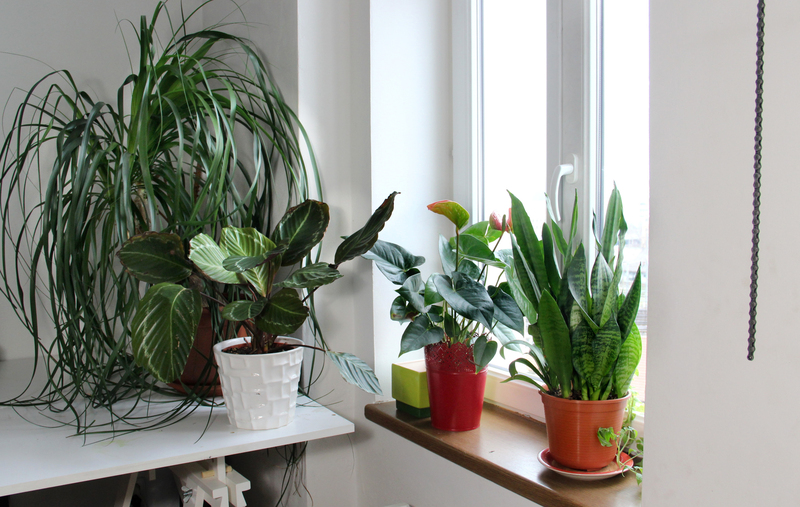Zen Garden Planning for a Rejuvenating Outdoor Experience
Posted on 13/08/2025
Zen Garden Planning for a Rejuvenating Outdoor Experience
Are you craving a tranquil oasis that soothes the mind, body, and spirit? Zen garden planning offers a mindful approach to landscaping, transforming any outdoor setting into a sanctuary for relaxation and contemplation. In this comprehensive article, we'll guide you through every step of designing your own Zen-inspired sanctuary that will revitalize your outdoor experiences.
What Is a Zen Garden?
A Zen garden--also known as karesansui or "dry landscape" garden--is a traditional Japanese garden style characterized by simple, minimalist elements such as rocks, gravel, carefully placed plants, and water features. Designed to foster peace and reflection, these spaces embody balance, simplicity, and the inspiration of nature.
- Karesansui (???): Focuses primarily on rocks, gravel, and sand.
- Chaniwa: A garden designed for the Japanese tea ceremony, often with stepping stones and moss.
- Roji: The path leading to the tea house, surrounded by lush greenery, symbolizing a journey to enlightenment.
Embracing the Zen garden principles can create a rejuvenating, harmonious space--right in your own backyard.

Benefits of Creating a Zen Garden for Outdoor Rejuvenation
Incorporating a Zen garden into your outdoor space yields a wide range of benefits that extend well beyond aesthetics:
- Stress Reduction: The minimalist design and organic forms promote mental clarity and help dissipate stress.
- Mindful Meditation: Use your Zen-inspired garden as a sanctuary for meditation, yoga, or mindful breathing routines.
- Natural Beauty: A Zen garden's serene structures and greenery enhance the overall visual appeal of your outdoor space.
- Low Maintenance: With fewer plants and simple elements, it's easier to maintain than traditional flower gardens.
- Seasonal Interest: Rocks, sand, and evergreen plants keep your garden visually appealing year-round.
Key Elements of a Zen Garden
Understanding the essential elements of Zen garden design is fundamental to successful planning. Here's what you'll need for a rejuvenating outdoor space:
1. Rocks and Stones
- The foundation: Symbolizing mountains and islands, rocks are central to any Zen garden landscape plan.
- Arrange in odd-numbered groupings for natural harmony.
2. Sand or Gravel
- Represents water or the void, raked in flowing patterns to convey ripples and tranquility.
- Use pale gravel or sand for the classic look and easy maintenance.
3. Minimalist Plantings
- Evergreen shrubs, moss, and bamboo offer year-round color and texture.
- Choose plants native to your region that evoke a natural Japanese aesthetic.
4. Water Features
- Include a small pond or fountain to symbolize calm and reflection, or use gravel to represent dry "water".
- Optional but impactful for sensory relaxation.
5. Pathways and Stepping Stones
- Simple stone paths guide visitors and create a sense of journey.
- Place them irregularly to mimic nature's randomness.
6. Ornaments and Accents
- Lanterns, water basins, and bamboo fences can be used sparingly for authenticity and subtle beauty.
Step-by-Step Guide to Planning Your Zen Garden
Whether you have a sprawling yard or a compact balcony, Zen outdoor planning can be tailored to any space. Follow these steps for a rejuvenating result:
Step 1: Assess Your Space
- Measure the area and take note of sun patterns, slopes, and existing structures.
- Decide if you want a large outdoor Zen garden or a small, intimate corner.
Step 2: Visualize the Layout
- Sketch your ideas or use garden planning software.
- Focus on simplicity--a hallmark of Zen landscaping!
Step 3: Select Materials and Elements
- Source rocks, gravel, plants, and ornaments that complement your home and personal sense of tranquility.
- Opt for locally sourced materials when possible for sustainability and budget.
Step 4: Prepare the Foundation
- Clear weeds, debris, and turf from your chosen site.
- Consider laying landscape fabric to prevent unwanted plant growth.
Step 5: Place Rocks and Stones
- Begin with anchor stones, then add clusters, leaving space for sand or gravel.
- Arrange rocks with intention--each position should feel balanced and purposeful.
Step 6: Add Sand or Gravel
- Spread a 2-3 inch layer of gravel or sand evenly across the area.
- Use a rake to create gentle wave or ripple patterns for a calming effect.
Step 7: Incorporate Plants and Greenery
- Plant moss, ferns, Japanese maples, or bamboo in strategic spots for color and life.
- Limit the plant palette to a few species for understated elegance.
Step 8: Introduce Paths and Accents
- Lay stepping stones to guide through the garden or to a focal viewing area.
- Add a lantern, water basin, or bamboo fence for authenticity.
Step 9: Maintain Your Zen Garden
- Regularly rake the gravel to refresh patterns and remove leaves.
- Trim plants and keep stones free of debris for a pristine, meditative appearance.
Small Space Zen Garden Planning Ideas
You don't need a large backyard to enjoy the benefits of a Zen garden. Consider these compact zen garden planning solutions:
- Container Zen Gardens: Use pots, planters, or even tabletop trays with mini rocks, sand, and moss for patio or balcony serenity.
- Vertical Gardens: Integrate bonsai trees or bamboo in vertical planters for a sense of enclosure and green tranquility.
- Corner Retreats: Convert an unused corner with gravel, a few stepping stones, and a single striking boulder or sculpture.
Design Tips for a Relaxing Zen-Inspired Outdoor Space
- Simplicity reigns: Less is more when it comes to Zen garden aesthetics. Avoid clutter and unnecessary elements.
- Balance: Strive for visual harmony between rocks, greenery, and open spaces--never overfill the area.
- Natural materials: Whenever possible, use wood, stone, bamboo, and natural fibers to deepen the organic feel.
- Careful placement: Every element in your garden should be placed with intention. If it doesn't serve a purpose, consider leaving it out.
- Privacy: Use screens, bamboo fencing, or tall plants to create an enclave shielded from outside noise or distraction.
Common Plants for Zen Gardens
- Moss: Soft and lush, adds green carpeting between rocks or along pathways.
- Bamboo: Tall and graceful, excellent for privacy screens or sound barriers.
- Japanese Maple: Stunning foliage for bursts of seasonal color.
- Ferns: Hardy, shade-loving, and perfect for softer textures.
- Pine Trees: Evergreen and symbolic of endurance and strength.
Incorporating Meditation into Your Zen Garden Experience
A primary function of Zen gardens is to serve as a spiritual retreat for meditation. Here's how to make the most of your rejuvenating outdoor haven:
Tips for Meditating in a Zen Garden:
- Create a designated meditation spot: Place a bench, flat rock, or cushion for comfortable seating.
- Establish a routine: Dedicate a few minutes daily to breathing, reflection, or gentle stretching in your garden.
- Engage the senses: Listen to a bubbling water feature, feel the textures of stone and sand, watch dappled light filter through leaves.
- Practice mindful raking: Rake the sand or gravel in meditative patterns to clear your mind and cultivate presence.
Maintenance: Keeping Your Zen Garden Pristine
- Regularly remove debris: Keep gravel, rocks, and plant beds free of fallen leaves and litter.
- Prune and trim: Maintain the shape and health of shrubs, moss, and bamboo.
- Weed control: Regularly check for unwanted plants breaking through the sand or gravel layers.
- Re-level gravel or sand: After raking or weather, smooth and replenish as necessary.

Frequently Asked Questions About Zen Garden Planning
- Can a Zen garden be created in any climate?
Yes! By choosing climate-appropriate plants, you can adapt Zen garden techniques nearly anywhere. - How much time does maintenance require?
Most Zen gardens are low-maintenance, requiring just a few minutes weekly for raking and tidying. - Is it expensive to build a Zen garden?
It can be budget-friendly! Use local rocks, plants, and bamboo, and start small. - Can I include other elements, like seating or sculptures?
Absolutely--just remember to prioritize simplicity and natural materials.
Conclusion: Start Your Rejuvenating Zen Garden Today
Planning a Zen garden for a rejuvenating outdoor experience is about more than landscaping--it's an invitation to transform your home into a sanctuary of peace and renewal. By following the principles outlined above and infusing your space with thoughtful design, you can create an environment that nurtures balance, beauty, and mindful connection to nature every day.
Ready to immerse yourself in tranquility? Begin your Zen garden planning journey today and discover the endless benefits of your own outdoor haven.
Latest Posts
Gardeners' Choice: 3 Top Tips for Effective Weed Control
Tips to Make Your Garden Accessible and Fun for Children
How to Transform Your Garden into a Winter Haven

